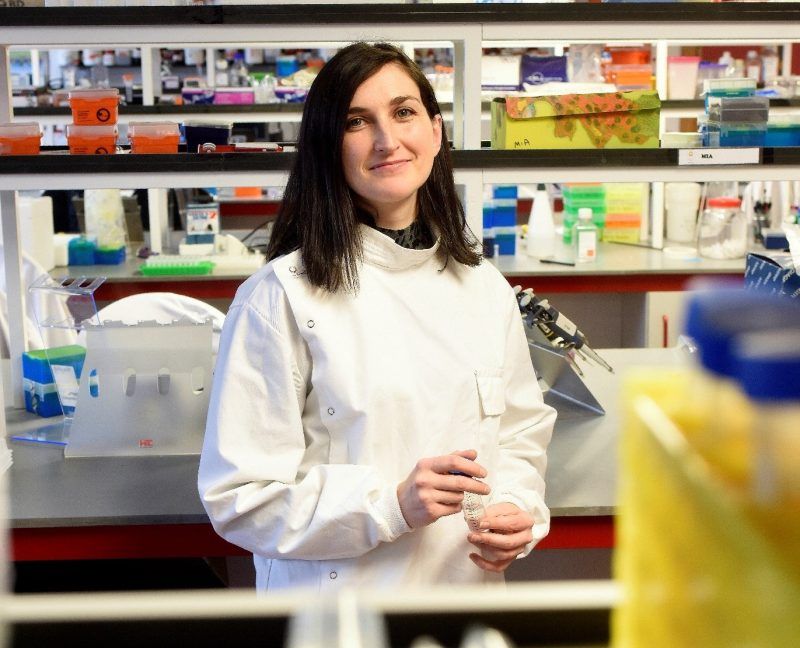Studying the cancer patient’s immune system to predict their response to treatment
Posted on: 30 September 2020
Senior Research Fellow, Dr Margaret Dunne at the Trinity St James’s Cancer Institute (TSJCI) is researching new ways to improve current treatment strategies for gastrointestinal cancers and develop alternative strategies for patients who may not respond to treatments.

In a recent study led by Professor Jacintha O’Sullivan and in collaboration with Dr James Phelan and St Vincent’s University Hospital, Dr Dunne looked at the presence of an immune marker, called HLA-DR, in people at different stages of colorectal cancer development. Immune markers are proteins that determine our ability to resist harmful agents like bacteria and other foreign substances. HLA-DR is normally found on immune cells and helps the body to detect infections and abnormalities and to activate immune responses. HLA-DR can also be found on tumours. In previous studies, the team had found that patients with higher levels of HLA-DR in their tumours live twice as long as those with little or no HLA-DR.
The team wanted to find out more about HLA-DR on tumours – specifically, at what stage in cancer development does HLA-DR appear? Do levels change when tumours progress and spread throughout the body? They took colorectal tissues from different stages of cancer development; from non-cancerous growths (polyps), to early and late stage tumours, and normal tissue near tumours, and measured the levels of HLA-DR.
They found that high HLA-DR levels in colorectal tumours and normal tissue near tumours were linked with patient longer survival time, especially at the early tumour development stage. They saw that HLA-DR levels were high from an early stage of cell abnormality in polyps and that levels were lower in early stage tumours, and even lower again in later stage tumours.
The team concluded that HLA-DR is an important marker for attracting the attention of the immune system to control the growth of abnormal cells which can develop into tumours, and loss of this marker results in shorter survival time. This suggests that HLA-DR could be a good target for future cancer therapies, if further research can be carried out to learn more about how tumour cells lose this marker as they progress.
Translational research at TSJCI
Dr Dunne works in an area of research called ‘translational research’ where she conducts scientific studies to try to answer complex questions, such as what factors affect cancer development, and can we predict how a patient will respond to cancer treatment by looking at their immune system? This type of research can take a very long time to directly impact on patients, but every study that is carried out at TSJCI gives researchers clues to what is going on, allowing bigger discoveries to be made.
In her work, Dr Dunne has discovered several new immune cell functions in cancer which had not been previously described. These cells and molecules may have potential as targets for future anti-cancer therapies, and her research is the first step in this process. She believes that what the team at TSJCI study today may not always have an immediate impact but will help future cancer patients.
Dr Dunne said:
Research is critical in the fight against cancer – for example, immunotherapy drugs have shown great success for some patients in recent years, yet we don’t fully understand how these work, nor how best to direct our immune systems to see and destroy cancer. If we can learn more about this process, we can develop even better drugs that work for even more people. But for this to happen, we need to dedicate more resources, infrastructure and funds toward research and encourage supporting researchers so these big discoveries can be made.
A major strength of conducting research at the Trinity St James’s Cancer Institute is the wealth of expertise within the institute, combined with the generosity of patients who donate their specimens and data to our dedicated biobanks. This allows us to carry out high quality research, with patient-centred outcomes. Our research team works alongside a multi-disciplinary team of scientists, surgeons, oncologists, physiotherapists and consultants.
Public and patient involvement (PPI) and outreach work at TSJCI
Dr Dunne’s research aims to help patients with gastrointestinal cancers, but her research may also be applicable to other cancer types. Her team at TSJCI have also engaged in some public and patient involvement (PPI) and outreach work, to help promote public awareness of these cancer types. Oesophageal cancer usually presents at a late stage, so early detection is a great way to improve survival odds and treatment options. She hopes that by raising public awareness about this cancer type, researchers can encourage people to visit their doctors earlier.
Dr Dunne’s team co-created an informational video with a school in Finglas West on ‘How Cancer Research Works’.
The Trinity St James’s Cancer Institute, TSJCI
The mission of the TSJCI is to integrate innovative and ground-breaking cancer science with compassionate, multi-disciplinary , patient-focussed care through translation of key research findings into incremental advances in the prevention, diagnosis and treatment of cancer.
